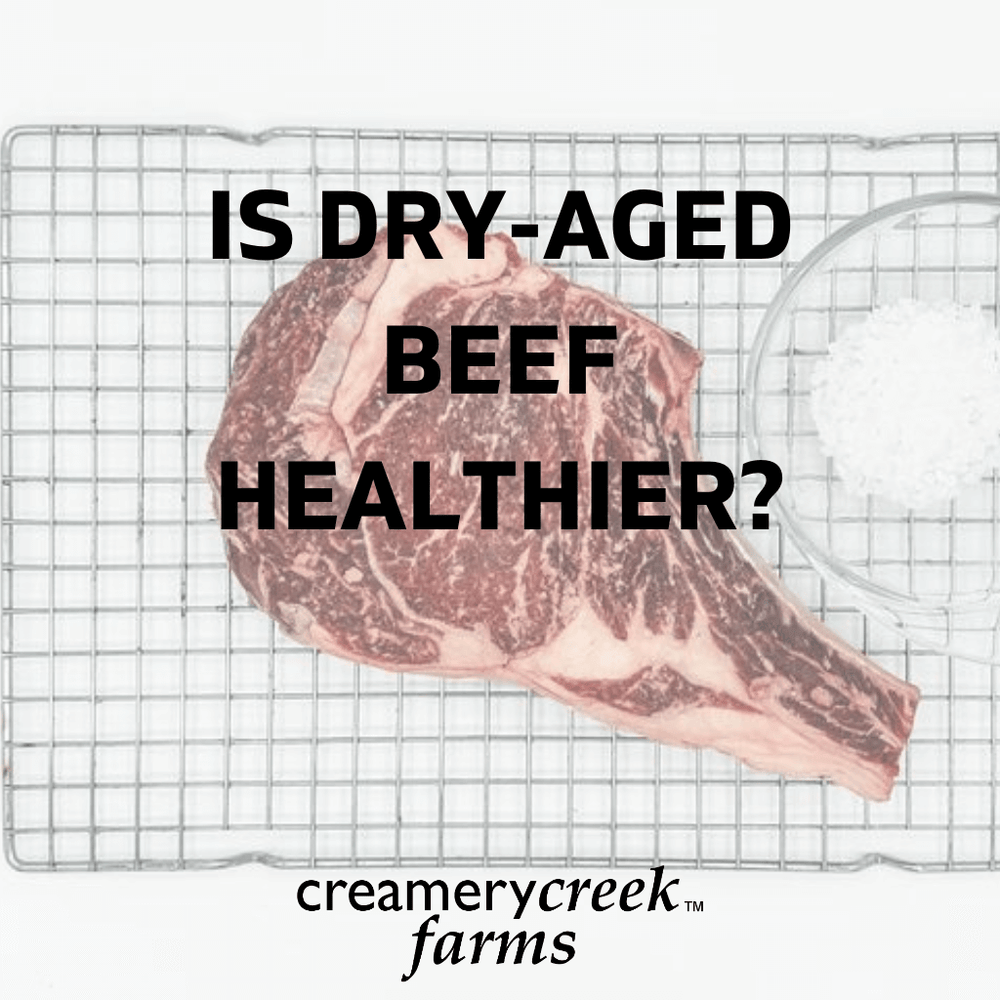
Real Talk About Flavor, Quality, and Purity
When I talk to people about dry-aged beef, they usually focus on its intense flavor and tenderness. But is it actually healthier than fresh beef? While it won’t drastically change its nutritional profile, dry-aged beef does offer some unique benefits—especially when it comes to purity and quality.
It’s my opinion that our homegrown dry aged beef is smart choice for those who care about what they eat.
What Makes Beef “Healthy” in the First Place?
For me, I think of “healthy” food as something that’s nutrient-dense, minimally processed, and free of unnecessary additives. With that definition in mind, dry-aged beef checks a lot of boxes:
• Rich in protein, iron, and essential vitamins – Just like fresh beef, dry-aged cuts are a great source of muscle-building protein and nutrients like B12 and zinc. My friends at the Wisconsin Beef Council call it ZIP! - Zinc, Iron and Protein.
• Naturally tender without added solutions – Unlike some commercial steaks that might be injected with solutions to improve tenderness, dry-aged beef becomes tender through time and natural enzyme activity. Like aged cheese, it gets better with time.
• Free of artificial preservatives – Wet-aged beef (the kind you’ll find vacuum-sealed in most stores) is sometimes treated with additives to extend shelf life. Dry-aged beef, on the other hand, is aged in a carefully controlled environment with nothing but air, temperature, and time working their magic. For me, we find a great balance in the magic of 21 day aged beef, so you'll find our beef collection minimally aged at 21 days.
The Purity of Dry-Aged Beef
One of the biggest advantages of dry-aged beef is what’s not in it. When you buy direct from a farm like ours, you’re getting meat that has been raised with care and processed with minimal interference. Here’s how dry-aged beef stands apart:
1. Less Water Weight
Grocery store beef is often wet-aged in vacuum-sealed plastic, a process that retains moisture but can sometimes dilute flavor. Some commercial beef is even injected with a salt or phosphate solution to make it more tender and extend shelf life. With dry-aged beef, there’s no need for that—the aging process naturally enhances tenderness and flavor.
2. No Added Preservatives
Our dry-aged beef is aged in a controlled, open-air environment where moisture evaporates and natural enzymes break down muscle fibers. Because of this, there’s no need for the additives or stabilizers that are often found in other meat.
3. Aging Enhances Quality, Not Just Longevity
Unlike wet-aged beef, which is aged primarily for logistics and convenience, dry-aged beef is aged specifically to improve its taste and texture. This means every bite is more concentrated in flavor, making it a premium choice for those who care about quality over mass production.
Is Dry-Aged Beef Healthier for You?
If you’re looking for beef that is:
✔️ Easier to digest due to its natural tenderness
✔️ Free of unnecessary additives or preservatives
✔️ Naturally more flavorful and nutrient-dense per ounce
✔️ Aged for quality, not just convenience
Then yes, dry-aged beef is a healthier choice. While it doesn’t change the fundamental nutrients of beef, its purity, quality, and traditional aging process make it a standout option for anyone who values real, high-quality food, especially straight from the source!
Taste the Difference with Creamery Creek Dry-Aged Beef
At Creamery Creek, we take pride in offering our own homegrown, dry-aged beef that’s full of rich flavor and free of unnecessary processing. So, if you’re searing a steak or slow-cooking a roast, you’ll taste the difference that careful aging and farm-direct quality make.
Are you ready to try it for yourself? Check out our selection of dry-aged beef cuts and experience beef the way it was meant to be, worth the wait!
xo,
Louisa



Leave a comment
Also in Farm Blog
Thawing Big Cuts: How Much Time to Pull from the Freezer
Ever wondered how long it really takes a ham or prime rib to thaw in the fridge? We’ve all been there, staring at a frozen roast two days before dinner. Here’s your guide to safe, slow thawing, including how many days to allow for bone-in versus boneless cuts and when to pull from the freezer so your meal goes off without a hitch.
Plus, a reminder why we only ship frozen, because that’s what keeps your meat safest and freshest.
Keep reading
What’s the Difference Between A1 and A2 Milk
Ever wonder if Creamery Creek milk is A1 or A2? The truth is, it’s a natural blend. Our Holstein herd includes both A1A2 and A2A2 cows, and while we track it through genomic testing, we don’t separate the milk. Here’s what that means and why we care about it.
Keep reading
Behind the Scenes: How Your Order Ships from Our Farm
Ever wonder what happens after you click “Place Order”? Take a peek behind the scenes to see how your Creamery Creek box is packed, shipped, and delivered straight from our family farm with care and attention in every step.
Keep reading